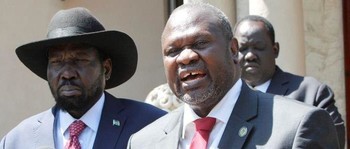Peace monitor urges rivals to end deadlock over state governments

Parties to South Sudan's peace deal have been urged to break a deadlock on responsibility sharing at the state and local governments.
The call came as the parties to the September 2018 peace deal hit a deadlock over plans to create state governments and local authorities.
The transitional government of national unity is not yet finalized as state governors, state ministers, state lawmakers and county commissioners are still to be appointed.
Ambassador Lt. Gen. Augustino Njoroge, the Interim Chairperson of the Reconstituted Joint Monitoring and Evaluation Commission (RJMEC) on Friday, called upon the parties to the peace deal to break the deadlock on responsibility sharing at the state and local governments.
This came during a consultative meeting of the parties to the peace deal, pursuant to Article 7.11 of the revitalized peace agreement, to break the deadlock on responsibility sharing at the state and local governments.
The peace monitoring body said the consultative meeting followed a request from Dr. Riek Machar, chairperson of the SPLM-IO and First Vice President for assistance of the RJMEC leadership to break a deadlock on the modalities of responsibility sharing as provided for in Article 1.16 of the peace agreement.
While addressing the meeting, Njoroge commended the parties for the compromises that they have made so far leading to the formation of the unity government and urged them to continue with the spirit of collegiality during the transitional period and beyond.
The interim chairperson also reminded the parties of the cardinal principles upon which the revitalized peace deal is anchored, which include inclusivity, equity, peace and reconciliation, collegiality, relationship and trust building, justice and fairness, among others.
Njoroge noted that any further delay in the finalization of responsibility sharing at the state and local governments would also delay the completion of the establishment of the unity government’s structure and composition.
According to RJMEC, the interim chairperson will continue to engage the parties to the peace agreement to ensure that the deadlock over state and local governments is expeditiously resolved.
The peace agreement says responsibility sharing at state and county levels shall be 55% for incumbent TGoNU, SPLM-IO 27%, SSOA 10% and OPP 8%.
The positions that shall be shared as per the responsibility sharing formula are governors, speakers of state legislatures, state councils of ministers, state legislatures, county commissioners and county councils.
The agreement also says Former Detainees shall have three state ministers in states of their choice.